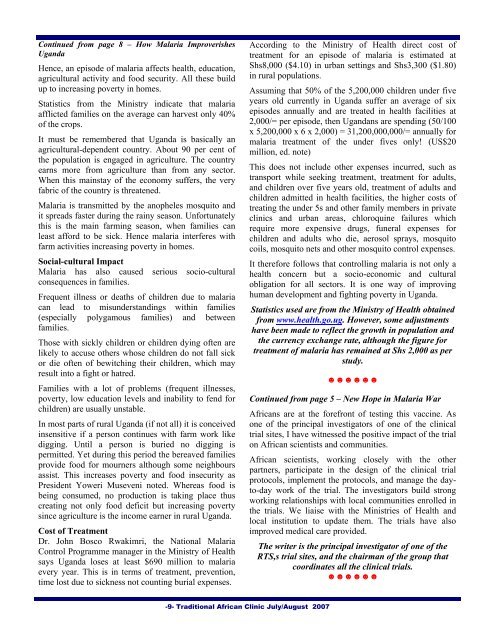African Traditional Herbal Research Clinic ... - Blackherbals.com
African Traditional Herbal Research Clinic ... - Blackherbals.com
African Traditional Herbal Research Clinic ... - Blackherbals.com
- No tags were found...
You also want an ePaper? Increase the reach of your titles
YUMPU automatically turns print PDFs into web optimized ePapers that Google loves.
Continued from page 8 – How Malaria ImproverishesUgandaHence, an episode of malaria affects health, education,agricultural activity and food security. All these buildup to increasing poverty in homes.Statistics from the Ministry indicate that malariaafflicted families on the average can harvest only 40%of the crops.It must be remembered that Uganda is basically anagricultural-dependent country. About 90 per cent ofthe population is engaged in agriculture. The countryearns more from agriculture than from any sector.When this mainstay of the economy suffers, the veryfabric of the country is threatened.Malaria is transmitted by the anopheles mosquito andit spreads faster during the rainy season. Unfortunatelythis is the main farming season, when families canleast afford to be sick. Hence malaria interferes withfarm activities increasing poverty in homes.Social-cultural ImpactMalaria has also caused serious socio-culturalconsequences in families.Frequent illness or deaths of children due to malariacan lead to misunderstandings within families(especially polygamous families) and betweenfamilies.Those with sickly children or children dying often arelikely to accuse others whose children do not fall sickor die often of bewitching their children, which mayresult into a fight or hatred.Families with a lot of problems (frequent illnesses,poverty, low education levels and inability to fend forchildren) are usually unstable.In most parts of rural Uganda (if not all) it is conceivedinsensitive if a person continues with farm work likedigging. Until a person is buried no digging ispermitted. Yet during this period the bereaved familiesprovide food for mourners although some neighboursassist. This increases poverty and food insecurity asPresident Yoweri Museveni noted. Whereas food isbeing consumed, no production is taking place thuscreating not only food deficit but increasing povertysince agriculture is the in<strong>com</strong>e earner in rural Uganda.Cost of TreatmentDr. John Bosco Rwakimri, the National MalariaControl Programme manager in the Ministry of Healthsays Uganda loses at least $690 million to malariaevery year. This is in terms of treatment, prevention,time lost due to sickness not counting burial expenses.According to the Ministry of Health direct cost oftreatment for an episode of malaria is estimated atShs8,000 ($4.10) in urban settings and Shs3,300 ($1.80)in rural populations.Assuming that 50% of the 5,200,000 children under fiveyears old currently in Uganda suffer an average of sixepisodes annually and are treated in health facilities at2,000/= per episode, then Ugandans are spending (50/100x 5,200,000 x 6 x 2,000) = 31,200,000,000/= annually formalaria treatment of the under fives only! (US$20million, ed. note)This does not include other expenses incurred, such astransport while seeking treatment, treatment for adults,and children over five years old, treatment of adults andchildren admitted in health facilities, the higher costs oftreating the under 5s and other family members in privateclinics and urban areas, chloroquine failures whichrequire more expensive drugs, funeral expenses forchildren and adults who die, aerosol sprays, mosquitocoils, mosquito nets and other mosquito control expenses.It therefore follows that controlling malaria is not only ahealth concern but a socio-economic and culturalobligation for all sectors. It is one way of improvinghuman development and fighting poverty in Uganda.Statistics used are from the Ministry of Health obtainedfrom www.health.go.ug. However, some adjustmentshave been made to reflect the growth in population andthe currency exchange rate, although the figure fortreatment of malaria has remained at Shs 2,000 as perstudy.☻☻☻☻☻☻Continued from page 5 – New Hope in Malaria War<strong>African</strong>s are at the forefront of testing this vaccine. Asone of the principal investigators of one of the clinicaltrial sites, I have witnessed the positive impact of the trialon <strong>African</strong> scientists and <strong>com</strong>munities.<strong>African</strong> scientists, working closely with the otherpartners, participate in the design of the clinical trialprotocols, implement the protocols, and manage the dayto-daywork of the trial. The investigators build strongworking relationships with local <strong>com</strong>munities enrolled inthe trials. We liaise with the Ministries of Health andlocal institution to update them. The trials have alsoimproved medical care provided.The writer is the principal investigator of one of theRTS,s trial sites, and the chairman of the group thatcoordinates all the clinical trials.☻☻☻☻☻☻-9- <strong>Traditional</strong> <strong>African</strong> <strong>Clinic</strong> July/August 2007
















